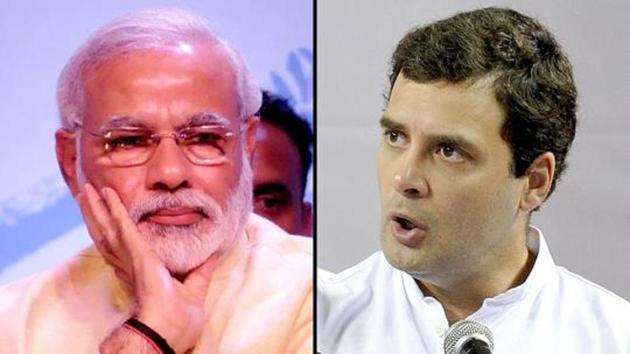Were Modi-Shah the ‘Sikandars’ of Gujarat and Rahul Gandhi the ‘Baazigar’?
If the Congress wants to position itself as a national alternative to the BJP, it will have to convince enough Indians that the party under Rahul has little to do with a discredited ancient regime of sloth and corruption and that it has a better economic agenda for jobs and growth than the BJP
In a movie-crazy country, election victories too are often projected in ‘filmi’ terms. When I referred to the narrow BJP victory in Gujarat as ‘jo jeeta woh sikandar’, a Congress leader responded with a dialogue from the Shahrukh Khan hit film, Baazigar: ‘kabhi kabhi jeetne ke liye kuch haarna bhi padta hai, aur haar kar jeetne wale ko baazigar kehte hain!’ So were the Narendra Modi-Amit Shah duo the ‘Sikandars’ of Gujarat 2017 or was Rahul Gandhi the ‘Baazigar’?

The answer to that question depends on which statistics you choose. The BJP could well claim that it has scored a remarkable sixth consecutive victory in Gujarat while the Congress could argue that it has reduced the BJP tally to double digits. Election results may be about arithmetic but the political narrative is often about chemistry. For the first half of 2017, as the BJP swept Uttar Pradesh and prised Goa and Manipur from the Congress, there seemed little doubt that the Modi-Shah combine were an unstoppable juggernaut. When the BJP president boasted of ‘Mission 150’ in the 182 member Gujarat assembly, few doubted him. After all, if the BJP could score a whopping three-fourths victory in the country’s most populous and complex state, then surely the home turf of the country’s two most powerful men was a breezy sea-plane ride along the Sabarmati riverfront?
By contrast, Rahul Gandhi and the Congress were down and out after their UP debacle. Rahul was seen as a non-serious politician, flitting in and out of the country, typecast as a non-meritocratic, dynasts, the party was dismissed as a patient in ICU with its Gujarat unit in total disarray. Most political observers expected the Congress to flop badly in Gujarat. But when a student who is expected to fail suddenly gets a first class, he has some reason to celebrate. Conversely, when the one who always gets distinction scrapes through with 60%, the jubilation is more muted.
The BJP made the mistake of taking the Gujarati voter for granted but it would be foolish for the Congress to think that a strong showing in rural Saurashtra means a national recovery. The semi-critical patient has only been given a small dose of fresh oxygen. In Gujarat the BJP was up against 22 years of anti-incumbency, yet the Congress had become hopelessly defunct. Rahul’s answer to the crisis was to co-opt populist local caste leaders from ‘outside’, encourage new faces in ticket distribution and, importantly, plunge into the election campaign with unprecedented energy. By positioning himself as the ‘underdog’ challenging the Modi model in its fortress, Rahul was able to garner traction if not always votes. It was an astute strategy, one which almost worked but for the fact that it was pitted against the most formidable election machine in the history of independent India led by a charismatic leader who still enjoys a huge emotional connect with his people.
But the Congress’s problems go well beyond the Modi versus Rahul battle. Can the Congress offer a vision that makes it more attractive to the rising aspirations of urban India (remember, the BJP swept urban Gujarat by a substantial margin)? Can it re-define its stand on secularism beyond temple-hopping in an attempt to avoid being stereotyped as pro-minorities? Can it offer substantive solutions to the structural crisis that bears down on the farmer, on the unemployment epidemic or the plight of SMEs? Is there a ‘nationalistic’ spirit that the Congress offers to challenge the BJP’s monopoly over the ‘India First’ rhetoric? And does the Congress have enough committed foot-soldiers to combat the BJP’s panna pramukhs and party workers on the ground?
In Gujarat, the Congress could get away with asking all the questions because it was the BJP that had to deal with anti-incumbency after a long stint in power. But if it wants to position itself as a national alternative to the BJP, the Congress will have to convince enough Indians that the party under Rahul has little to do with a discredited ancient regime; and is actually seeking to build a more compassionate, inclusive India based on the politics of hope not fear, and that it has a better economic agenda for jobs and growth than the BJP. Gujarat has opened a window of opportunity for the Congress but unless it is able to sustain the momentum, it will remain a case of ‘Dilli dur ast’.
Post-script: A day before the Gujarat counting, a Hindi news anchor casually asked me: ‘Kya Modi aur BJP ko Gujarat mein harana muskhil nahin, namumkin hai?’ That dialogue from another Shah Rukh Khan hit film Don suggested that the BJP was invincible in Gujarat. As the Gujarati voter has shown, in a vibrant democracy, invincibility is a myth that can only lead to self-delusion and arrogance.
Rajdeep Sardesai is senior journalist and author
Theviews expressed are personal





